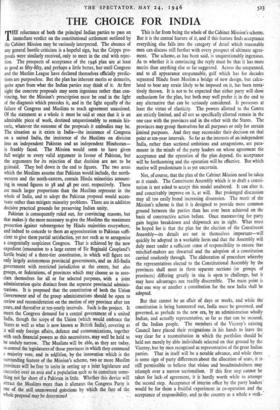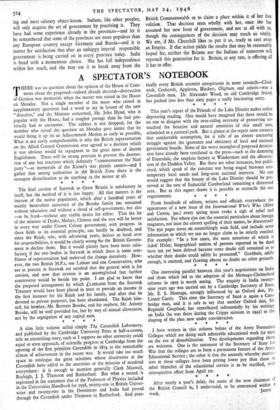THE CHOICE FOR INDIA
THE reluctance of both the principal Indian parties to pass an immediate verdict on the constitutional settlement outlined by the Cabinet Mission may be variously interpreted. The absence of any general hostile criticism is a hopeful sign, but the Cripps pro- posals were similarly received, only to meet in the end with rejec- tion. The prospects of acceptance of the 1946 plan are at least as good as fifty-fifty, and perhaps a little better, but until Congress and the Muslim League have declared themselves officially predic- tions are purposeless. But the plan has inherent merits or demerits, quite apart from what the Indian parties may think of it. At first sight the concrete proposals may seem ingenious rather than con- vincing, but the Mission's prescription must be read in the light of the diagnosis which precedes it, and in the light equally of the failure of Congress and Muslims to reach agreement unassisted. Of the statement as a whole it must be said at once that it is an admirable piece of work, destined unquestionably to remain his- toric, whatever the outcome of the proposals it embodies may be. The situation as it exists in India—the insistence of Congress on a united India, the insistence of the Muslims on division into an independent Pakistan and an independent Hindustan— is frankly faced. The Mission would seem to have given full weight to every valid argument in favour of Pakistan, but the arguments for its rejection of that decision are not to be gainsaid. They boil down in the end to figures. The two areas which the Muslims assume that Pakistan would include, the north- western and the north-eastern, contain Hindu minorities amount- ing in round figures to 38 and 48 per cent. respectively. These are much larger proportions than the Muslims represent in the whole of India, and to adopt the Pakistan proposal would accen- tuate rather than mitigate minority problems. There are in addition decisive practical grounds for preserving Indian unity.
Pakistan is consequently ruled out, for convincing reasons, but that makes it the more necessary to give the Muslims the maximum protection against submergence by Hindu majorities everywhere, and indeed to concede to them an approximation to Pakistan suffi- cient DO give them partial satisfaction, yet not such as to antagonise a congenitally suspicious Congress. That is achieved by the new expedient (emanation to a large extent of Sir Reginald Coupland's fertile brain) of a three-tier constitution, in which will figure not only largely autonomous provincial governments, and an All-India government with restricted jurisdiction at the centre, but also groups, or federations, of provinces which may choose so to asso- ciate themselves for all or for selected purposes, with a joint administration quite distinct from the separate provincial adminis- trations. It is proposed that the constitution of both the Union Government and of the group administrations should be open to review and reconsideration on the motion of any province after ten years, and thereafter at ten-yearly intervals. Such is the project. It meets the Congress demand for a central government of a united India, though the scope of the Union (which would embrace the States as well as what is now known as British India), covering as it will only foreign affairs, defence and communications, together with such financial powers as this necessitates, may well be held to be unduly narrow. The Muslims will be able, as they are today, to control. the legislatures of those provinces in which they command a majority vote, and in addition, by the innovation which is the outstanding feature of the Mission's scheme, two or more Muslim provinces will be free to unite in setting up a joint legislature and executive over an area and a population such as to constitute some- thing not far short of a Pakistan in little. Whether this device will attract the Muslims more than it alienates the Congress Party is one of the still unanswered questions by which the .fate of the whole proposal may be determined This is far from being the whole of the Cabinet Mission's scheme. But it is the central feature of it, and if this feature finds acceptance everything else falls into the category of detail which reasonable men can discuss still further with every prospect of ultimate agree- ment. The scheme, as has been said, is unquestionably ingenious. As to whether it is convincing the reply must be that it has more merits than anything else so far suggested. Across the unspanned, and to all appearance unspannable, gulf which has for decades separated Hindu from Muslim a bridge of new design, but calcu- lated to bear any strain likely to be imposed on it, has been tenta-: tively thrown. It is not to be expected that either party will show enthusiasm for the plan, but both may well prefer it in the end to any alternative that can be seriously considered. It possesses at least the virtue of elasticity. The powers allotted to the Centre are strictly limited, and all not so specifically allotted remain in the one case with the provinces and in the other with the States. The provinces may group themselves for all purposes or only for certain limited purposes. And they may reconsider their decision on that point at ten-year intervals. So far as the interests of an independent India, rather than sectional ambitions and antagonisms, are para- mount in the minds of the party leaders on whose agreement the acceptance and the operation of the plan depend, the acceptance will be forthcoming and the operation will be effective. But which motive will predominate is as yet uncertain.
Not, of course, that the plan of the Cabinet Mission need be taken as it stands. The Constituent Assembly which is to draft a consti- tution is not asked to accept this model unaltered. It can alter it. and conceivably improve on it, at will. But prolonged discussion may all too easily breed increasing dissension. The merit of the Mission's scheme is that it is designed to provide more common ground between the parties than has ever been achieved on the basis of constructive action before. Once manceuvring for party gain begins breakdown and shipwreck are in sight. What must be hoped for is that the plan for the election of the Constituent Assembly—its details are not in themselves important—will quickly be adopted in a workable form and that the Assembly will duly meet under a sufficient sense of responsibility to ensure that mischief-makers are thwarted and the adoption of a constitution carried resolutely through. The elaboration of procedure whereby the representatives elected to the Constitutional Assembly by the provinces shall meet in three separate sections (or groups of provinces) differing greatly in size is open to challenge, but it may have advantages not readily discernible. The main point is that one way or annther a constitution for the new India shall be adopted.
But that cannot be an affair of days or weeks, and while the constitution is being hammered out, India must be governed, and' governed, as prelude to the new era, by an administration wholly Indian, and actually representative, so far as that can be secured, of the Indian people. The members of the Viceroy's existing Council have placed their resignations in his hands to leave the way clear for a reconstitution in which the portfolios should be held not merely by able individuals selected on that ground by the Viceroy, but by men recognised as representative of the great Indian parties. That in itself will be a notable advance, and while there is some sign of party differences about the allocation of seats, it is still permissible to believe that vision and broadmindedness may triumph over a narrow sectionalism. If this first step cannot be taken for lack of agreement, it is hardly worth while to attempt the second step. Acceptance of interim office by the party leaders" would be for them a fruitful experiment in co-operation and the , acceptance of responsibility, and to the country as a whole a strik- ing and most salutary object-lesson. Indians, like other peoples, will only acquire the art of government by practising it. They have had some experience already in the provinces—and let it be remembered that some of the provinces are more populous than any European country except Germany and Russia—and it is matter for satisfaction that after an unhappy interval responsible government is being carried on in every province today. India is freed with a momentous choice. She has full independence within her reach, and she may use it to break away from the British Commonwealth or to claim a place within it of her free volition. That decision rests wholly with her, once she has assumed her new form of government, and not at all with us, though the consequences of the decision may touch us vitally. We are, if Mr. Churchill likes to put it so, ready to cast away an Empire. If that action yields the results that may be reasonably hoped for, neither the Britons nor the Indians of tomorrow will reproach this generation for it. Britain, at any rate, is offering all it has to offer.



























 Previous page
Previous page